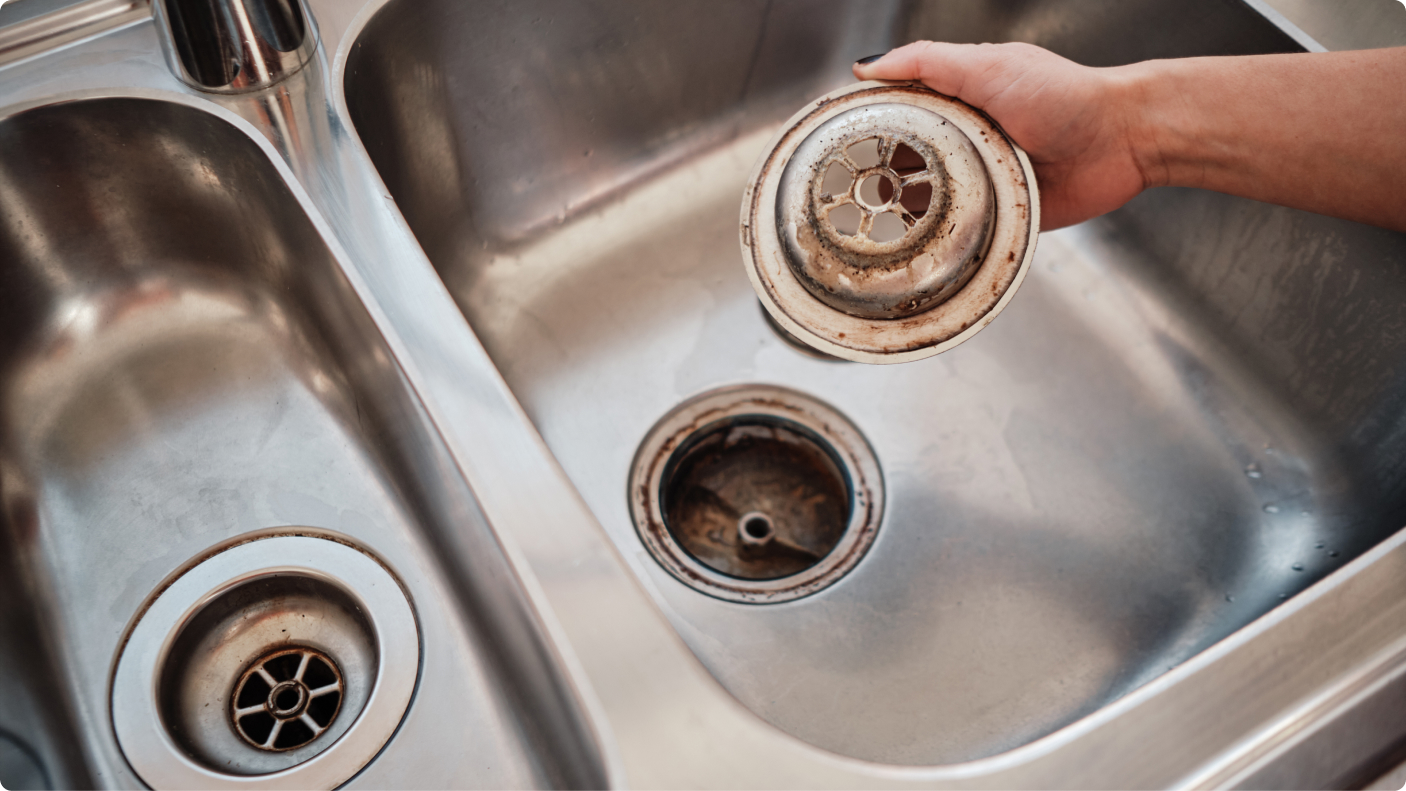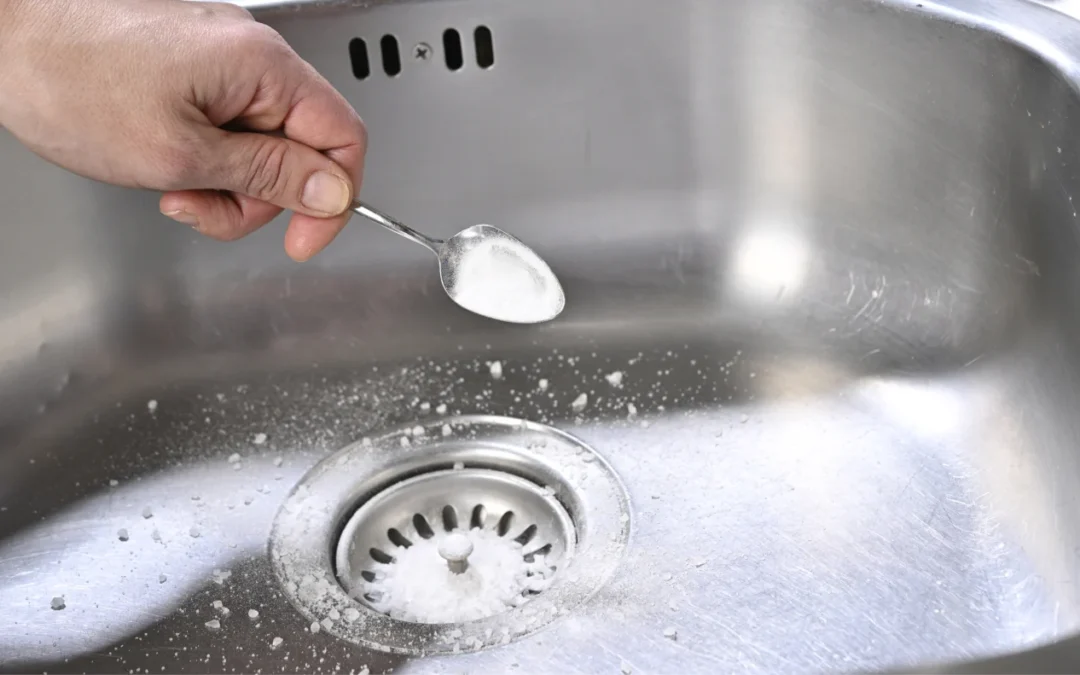You’ve likely faced the frustration of a slow-draining kitchen sink. It’s inconvenient and can disrupt your daily routine.
As you stand over the sink, wondering how to tackle the problem, the thought of using drain cleaner might have crossed your mind. But wait – is it safe to pour drain cleaner down your kitchen sink? You’re not alone in wondering about the potential impacts on your plumbing and safety.
This article aims to clear up the confusion and help you make an informed choice. Discover the surprising truths about using drain cleaner in your kitchen sink, and learn how to protect both your home and your peace of mind. Keep reading to ensure your kitchen remains a safe and efficient space.
Common Reasons For Kitchen Sink Clogs
Kitchen sink clogs are a common headache in many households. Understanding why they happen can save you time and stress. Let’s dive into the most common reasons your kitchen sink might be clogged.
Food Waste Accumulation
One of the biggest culprits is food waste. Bits of food can easily slip down the drain during dishwashing. Over time, these leftovers build up and cause blockages.
Consider clearing plates into the trash before rinsing them. It’s a simple habit but can make a huge difference.
Grease Build-up
Grease is sneaky. You might not realize it’s causing problems until your sink starts draining slowly. Cooking oils and fats solidify in pipes, leading to stubborn clogs.
Next time you cook, collect grease in a jar instead of pouring it down the sink. You’ll prevent the build-up and make cleaning easier.
Soap Scum And Residue
Soap is supposed to clean, right? But over time, soap scum can stick to the pipes and contribute to clogs. The residue mixes with food particles, forming a sticky mess.
Rinsing your sink with hot water after dishwashing can help dissolve soap scum. A quick rinse could save you from a major blockage.
Foreign Objects
Ever dropped a spoon down the drain by accident? You’re not alone. Small items like utensils or even bottle caps can cause big problems.
Install a drain cover to catch foreign objects. It’s a small investment that can prevent larger issues.
So, what’s your kitchen sink clog story? Have you ever found something unexpected causing the blockage? Share your experiences and solutions in the comments below!
Types Of Drain Cleaners
When dealing with a clogged kitchen sink, the choice of drain cleaner can make all the difference. Not all drain cleaners are created equal, and understanding the types available can help you choose the best one for your needs. Let’s dive into the various options and see which might be the right fit for your kitchen woes.
Chemical Drain Cleaners
Chemical drain cleaners are often the go-to solution for many households facing stubborn clogs. They work fast and are readily available at most grocery stores. These cleaners use strong chemicals like sodium hydroxide or sulfuric acid to dissolve clogs.
While they are effective, they come with some risks. The harsh chemicals can damage pipes over time and pose safety hazards if not handled properly. Always wear gloves and ensure proper ventilation when using them.
If you’ve ever used one, you might recall the pungent smell or the slight panic when a splash lands on your skin. Exercise caution, and only use them when absolutely necessary.
Enzyme-based Cleaners
Enzyme-based cleaners offer a gentler approach to unclogging your sink. These cleaners use natural enzymes to break down organic matter like food and grease. They are safer for your pipes and the environment.
The catch? They usually require a bit more patience. Enzyme cleaners work slower than their chemical counterparts, often needing a few hours to overnight to be effective.
Have you ever felt the frustration of waiting for results? It might test your patience, but the trade-off is a safer and more eco-friendly solution.
Homemade Solutions
For those who prefer a DIY approach, homemade solutions can be surprisingly effective. Common ingredients like baking soda and vinegar can create a fizzy reaction that helps break down minor clogs.
These solutions are not only cost-effective but also safe for your pipes and the environment. However, they may not work for tougher clogs that require more powerful intervention.
Have you tried a homemade remedy only to see partial results? It can be a mixed bag, but it’s worth considering for minor blockages.
Choosing the right type of drain cleaner can save you time, money, and stress. What will your next choice be when faced with a kitchen sink dilemma?
How Chemical Drain Cleaners Work
Understanding how chemical drain cleaners work can clarify their efficiency. These cleaners use potent chemicals to dissolve clogs in your sink. Knowing the science behind them can help you use them effectively.
Active Ingredients
Chemical drain cleaners contain powerful ingredients. Common components are sulfuric acid and sodium hydroxide. These substances break down organic matter quickly. They target grease, hair, and food particles.
Sulfuric acid is corrosive. It dissolves clogs by breaking chemical bonds. Sodium hydroxide, or caustic soda, is alkaline. It reacts with water to produce heat. This heat helps to melt away blockages.
Chemical Reactions
Drain cleaners work through chemical reactions. Acid-based cleaners release hydrogen ions. These ions attack and break down the clog. Heat and gas are often produced during the reaction.
Alkaline cleaners cause saponification. This process turns fats into soap. The soap then washes away with water. These reactions are quick and powerful. They clear drains efficiently.
Understanding these chemical reactions helps ensure safe use. Always follow instructions for best results.

Credit: www.liquidplumr.com
Potential Risks Of Using Drain Cleaners
Drain cleaners can damage kitchen sink pipes, especially if they’re older or made of certain materials. Chemical cleaners might also pose health risks due to fumes or accidental skin contact. It’s crucial to consider safer alternatives like baking soda and vinegar for regular maintenance.
When your kitchen sink becomes clogged, reaching for a drain cleaner might seem like a quick fix. However, before you pour that bottle down the drain, it’s crucial to understand the potential risks involved. Drain cleaners can indeed offer a temporary solution, but they often come with hidden dangers that could lead to bigger problems in the long run. Let’s delve into the specific risks you might face when using drain cleaners.Pipe Corrosion
Drain cleaners are highly corrosive. The chemicals used can erode your pipes over time, especially if they’re made of older materials like galvanized steel or copper. You might clear the immediate clog, but the long-term damage could lead to costly repairs or replacements. I remember using a drain cleaner in my old apartment. Initially, it worked like a charm, but a few months later, I faced a burst pipe that cost a fortune to fix. It made me rethink my approach to quick-fix solutions.Health Hazards
The fumes from drain cleaners can be hazardous. Breathing them in can irritate your eyes, throat, and lungs. In some cases, accidental skin contact can cause burns or allergic reactions. Have you ever poured drain cleaner down the sink and felt a burning sensation in your throat or eyes? It’s not just unpleasant; it’s unsafe. It’s always better to use protective gear and ensure proper ventilation if you must use these products.Environmental Impact
Drain cleaners can harm the environment. Once they flow down your pipes, they eventually reach local waterways. These chemicals can disrupt aquatic ecosystems and harm wildlife. Consider the impact next time you reach for a chemical solution. Is clearing a minor clog worth contributing to environmental damage? There are eco-friendlier alternatives that are just as effective. Next time you’re faced with a clogged sink, think about these risks. Are you willing to trade short-term relief for potential long-term issues? By considering the implications of using drain cleaners, you can make a more informed decision that protects both your home and health.Safety Precautions
Using drain cleaner in a kitchen sink requires caution. Always wear gloves and ensure the area is well-ventilated. Read the product instructions to avoid damaging pipes or causing harm.
When you’re dealing with a clogged kitchen sink, reaching for a drain cleaner might seem like an easy fix. However, it’s crucial to prioritize safety before you pour any chemicals down the drain. Drain cleaners are potent substances that can pose risks if not handled correctly. To ensure your safety and prevent damage to your plumbing, take note of these important safety precautions.Protective Gear
Wearing the right protective gear is your first line of defense. Always wear gloves to protect your hands from harsh chemicals. It’s also a good idea to wear safety goggles to prevent any splashes from reaching your eyes. Trust me, you don’t want to find out how painful chemical burns can be. Even a simple apron can shield your clothes from accidental spills.Ventilation Needs
Proper ventilation is essential when using drain cleaners. These products can release fumes that might irritate your lungs and eyes. Open windows and doors to let fresh air circulate through your kitchen. If possible, switch on a fan to help disperse any lingering odors. You wouldn’t want to breathe in toxic fumes while trying to clear a blockage.Proper Usage Instructions
Carefully read the instructions on the drain cleaner’s label. Follow the recommended amount; using more doesn’t mean it’s more effective and can actually cause more harm. Pour the cleaner slowly to avoid splashing. Remember, patience is key—give the cleaner time to work its magic. Have you ever poured a cleaner and immediately expected results? It’s tempting, but waiting ensures it performs effectively. Keep children and pets away during this process to prevent accidental exposure. Taking these safety precautions not only protects you but also ensures the effectiveness of the drain cleaner. Next time your kitchen sink clogs, you’ll be ready to tackle the problem safely and efficiently.
Credit: trusteyman.com
Alternatives To Chemical Drain Cleaners
Kitchen sinks often face clogs that disrupt daily chores. Many people reach for chemical drain cleaners, but these can harm pipes and the environment. Luckily, there are simple and effective alternatives. They are safer for both your home and nature.
Plungers
Plungers offer a straightforward solution for clogged sinks. They work by using suction to clear blockages. It’s essential to seal the drain completely for effective results. A few firm pushes can usually clear minor clogs. This tool is a must-have in every kitchen. It requires minimal effort and delivers quick results.
Drain Snakes
Drain snakes, also known as augers, tackle tougher clogs. They navigate through pipes, removing debris that plungers can’t reach. Insert the snake gently into the drain and twist to break the blockage. They come in various sizes, suitable for different types of clogs. Drain snakes are handy for regular maintenance, preventing future issues.
Professional Plumbing Services
Sometimes, clogs demand expert attention. Professional plumbers offer thorough solutions for persistent blockages. They use advanced tools and techniques to diagnose and fix problems. Hiring a plumber ensures the job is done right. It saves time and prevents further damage to your plumbing system. Professionals provide peace of mind with their expertise.
Preventive Measures For Clog-free Sinks
Keeping your kitchen sink clog-free can seem like a daunting task, but with a few preventive measures, you can avoid the hassle of dealing with stubborn blockages. By adopting regular maintenance habits, being mindful of what goes down your drain, and using drain guards, you can ensure your sink remains clean and efficient. Let’s dive into some practical steps you can take.
Regular Maintenance
Regularly cleaning your sink is crucial. A simple mix of baking soda and vinegar can work wonders. Pour baking soda down the drain, followed by vinegar, and let it fizz for a few minutes before rinsing with hot water.
This natural remedy not only helps in keeping the pipes clear but also prevents foul odors. Make it a habit to do this once a month.
Consider scheduling a professional plumbing check-up annually to catch any underlying issues. Prevention is always better than cure!
Mindful Disposal Practices
The way you dispose of waste can greatly impact the health of your sink. Avoid flushing down greasy substances like oils and fats. They solidify over time and can cause serious blockages.
Food scraps should be tossed in the trash or composted, not washed down the sink. Even small particles can accumulate and clog your pipes.
Are you guilty of rinsing coffee grounds down the sink? Think again! They can stick to the pipes and create blockages.
Use Of Drain Guards
Drain guards are a simple yet effective tool to keep your sink clog-free. They act as a barrier, preventing large particles from entering the drain.
Invest in a good-quality drain guard that fits your sink properly. They are widely available and come in various sizes and materials.
Regularly clean the drain guard to ensure it remains effective. It’s a small step that can save you from big plumbing headaches.
Are you ready to take control of your kitchen sink’s health? Implement these preventive measures and enjoy a clog-free kitchen experience. What’s stopping you from starting today?

Credit: www.youtube.com
When To Call A Professional
Drain cleaners offer a quick solution for kitchen sink clogs. Yet, they aren’t always the best option. In some cases, calling a professional plumber is necessary. Professionals bring expertise and tools to handle tough plumbing issues. So, when should you make that call? Let’s explore.
Persistent Clogs
Some clogs just won’t budge. You pour drain cleaner, wait, and nothing happens. This signals a deeper issue. Drain cleaners dissolve minor blockages. They can’t tackle stubborn clogs. These need professional attention. A plumber can identify the root cause. They use specialized tools for effective solutions.
Recurring Issues
Your sink clears, but clogs return. This cycle is frustrating. It indicates an underlying problem. Drain cleaner offers temporary relief. It doesn’t solve the issue long-term. A professional can diagnose persistent problems. They ensure your plumbing works smoothly.
Complex Plumbing Systems
Modern homes have intricate plumbing systems. These systems can confuse homeowners. Drain cleaners may not work well. They might even cause damage. Professional plumbers understand complex setups. They know how to handle unique challenges. This expertise prevents costly mistakes.
Frequently Asked Questions
Is It Safe To Use Drain Cleaner In Kitchen Sinks?
Using drain cleaner in kitchen sinks can be risky. Some cleaners might damage pipes or harm septic systems. Always read the label and follow instructions carefully. Consider natural alternatives like baking soda and vinegar for a safer option.
What Types Of Drain Cleaners Are Available?
Drain cleaners come in liquid, gel, and powder forms. Some are chemical-based, while others are enzymatic or natural. Chemical cleaners are powerful but can be harsh. Enzymatic cleaners are gentler and eco-friendly, suitable for minor clogs.
Can Drain Cleaner Damage Kitchen Pipes?
Yes, drain cleaners can damage pipes, especially if used excessively. Chemical reactions may weaken or corrode pipe materials over time. Always use drain cleaners sparingly and consider professional assistance for persistent issues.
How To Use Drain Cleaner Safely?
To use drain cleaner safely, wear gloves and eye protection. Follow the manufacturer’s instructions closely. Avoid mixing different cleaners, as this can cause harmful reactions. Ensure proper ventilation and keep children and pets away during use.
Conclusion
Using drain cleaner in the kitchen sink requires caution. It’s crucial to check if the cleaner suits your sink’s material. Some chemicals harm pipes and surfaces. Regular maintenance helps avoid clogs, reducing the need for harsh cleaners. Consider natural alternatives like baking soda and vinegar.
They are safer for pipes and the environment. Always read labels and follow instructions carefully. If problems persist, consult a plumber for professional advice. Protect your kitchen and its plumbing with informed choices. Keep your sink clean and functional with mindful practices.

As the chief content writer, Hassan Al Sarker works as a professional kitchen-based content creator at Kitchen Liker.
In addition to reviewing the content published on Kitchen Liker, he ensures that it is accurate, relevant, and helpful. As a result, all the reviews and information published at Kitchen Liker are neutral and userfriendly.
Hassan Al Sarker has a bachelor’s degree in Hotel and Tourism Management From the Newyork University. Before joining Kitchen Liker, he was a contributor at Kitchen Club, United States.

